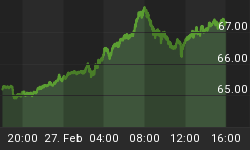The purpose of this newsletter is to provide you with an analytical observation of markets, politics, events, business and economics. This work and writing takes place amidst an enormous amount of background noise, white noise.
Such background distortion can make the real picture seem unintelligible. Most people hear the noise and interpret it as truth, because it can be easily understood.
I am talking about noise "aimed at the broad masses." Noise that "speaks the language of the people because it wants to be understood by the people. Its task is the highest creative art of putting sometimes complicated events and facts in a way simple enough to be understood by the man on the street. Its foundation is that there is nothing the people cannot understand, but rather things must be put in a way that they can understand. It is a question of making it clear to him by using the proper approach, evidence and language."
In effect we are captive to a never-ending series of stories from corporations, governments, markets and media that have little grounding in fact. We are provided with ideas that are easy to understand, that are not complicated, and that are not accurate.
Stories get told towards an agenda, the major agenda being a clouding of fact. Without pervasive falsehood, our society would be impossible to manage. Thus, it would lose its cohesion.
Beyond the noise, the anachronistic realities of land and sea empires remain. Technology has not risen to the point of being able to meet the basic requirements of the world's population.
Therefore, in light of such shortfalls, the essential elements of subsistence and well-being must either be captured-coveted, concentrated, or rationed. Even in so-called wealthy countries, things like health care are rationed. In a corporate system a mission exists to concentrate and capture wealth, to selectively allocate and covet wealth.
When commerce fails (or, more likely, when a major military force has been underfunded), the land and sea empires are forced to reach out across the world to influence the way that resources will be acquired and allocated.
Background noise "is a means to an end. Its purpose is to lead the people to an understanding that will allow them willingly and without internal resistance to devote themselves to the tasks and goals of a superior leadership. If leadership is to succeed, it must know what it wants. It must keep a clear and firm goal in mind, and seek the appropriate means and methods to reach that goal. Leadership as such is neither good nor evil. Its moral value is determined by the goals it seeks."
From the US political perspective, continuity is the goal that leadership seeks. The "people" to be serviced first are corporate entities, directors and oligarchs. Thereafter citizen-serfs need to be pleased. Essentially we rely on stability of fact, and when that fails, stability of message.
In the good old days, leadership was asserted from top down, from government to the people. In the modern age, leadership has taken on a horizontal rather than a vertical dynamic. Jobs are reliant on a horizontal dynamic, for we all need to believe that we participate in a vibrant, productive, democratic and virtuous free-market system.
I am not blaming any individual leader for a systemic condition, a horizontal dynamic whereby message has trumped and replaced fact. Instead I am trying to make a point. Systems where message replaces substance can have great staying power, but when they end, they do so dramatically and with significant adverse effect.
For this reason, when thinking about markets and the media and American politics, keep in mind the quotations above. They are all from Joseph Goebbels (1897-1945), Hitler's propaganda minister. Firstly, don't mistake noise for fact. Secondly, there is a fine line between leadership and propaganda.
Editing services by Jeremy Irwin, jc9cz@yahoo.com















